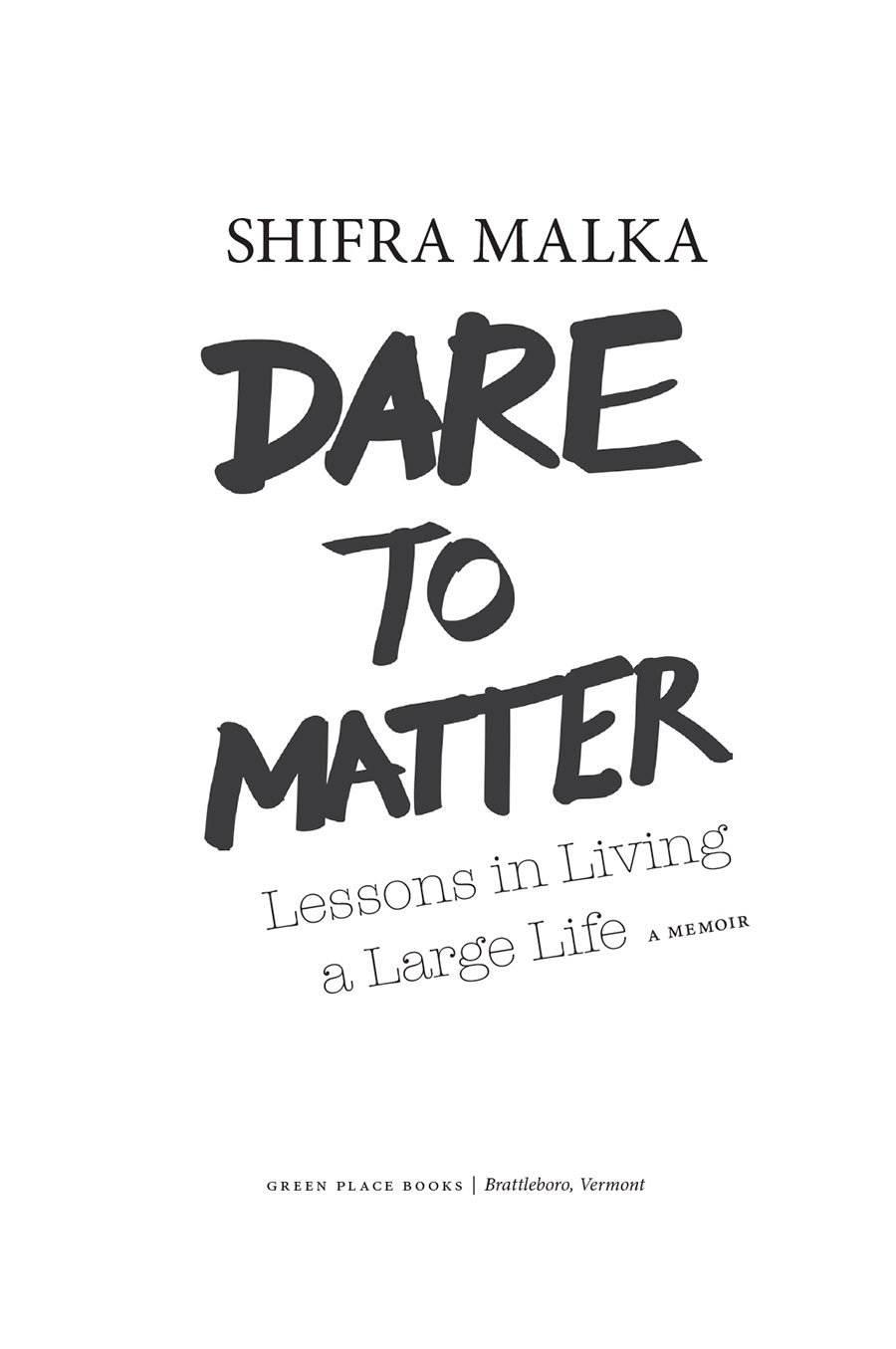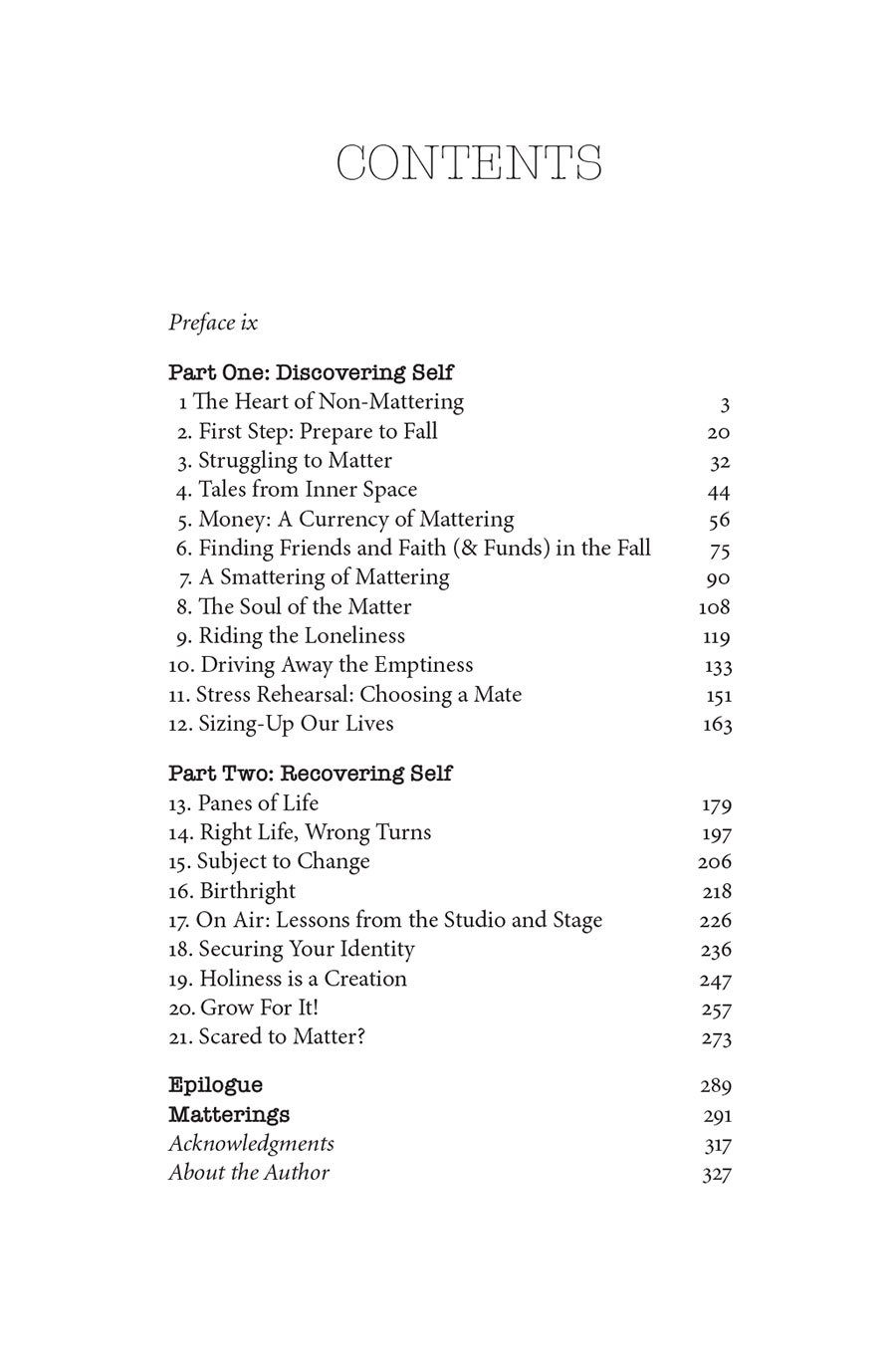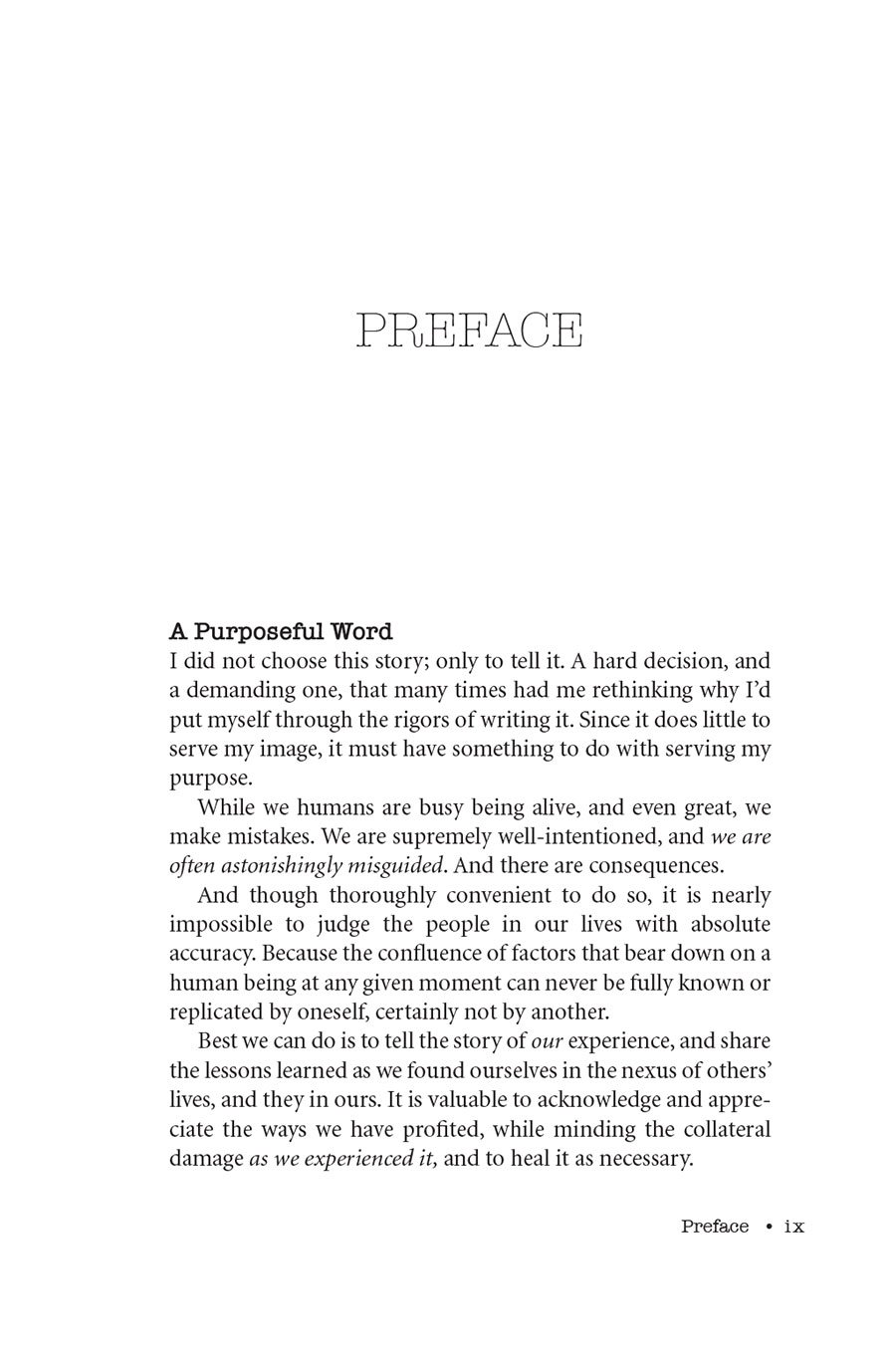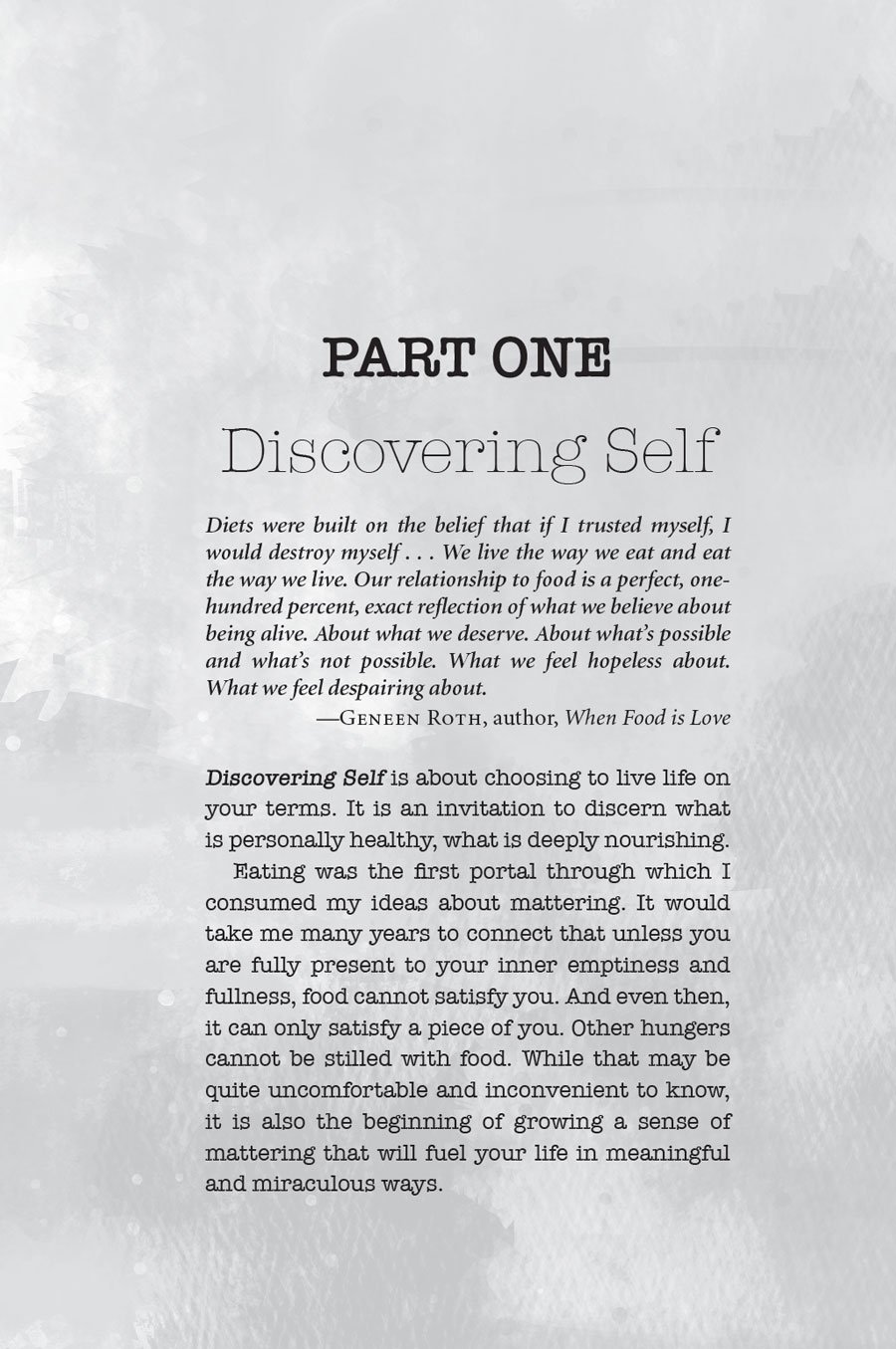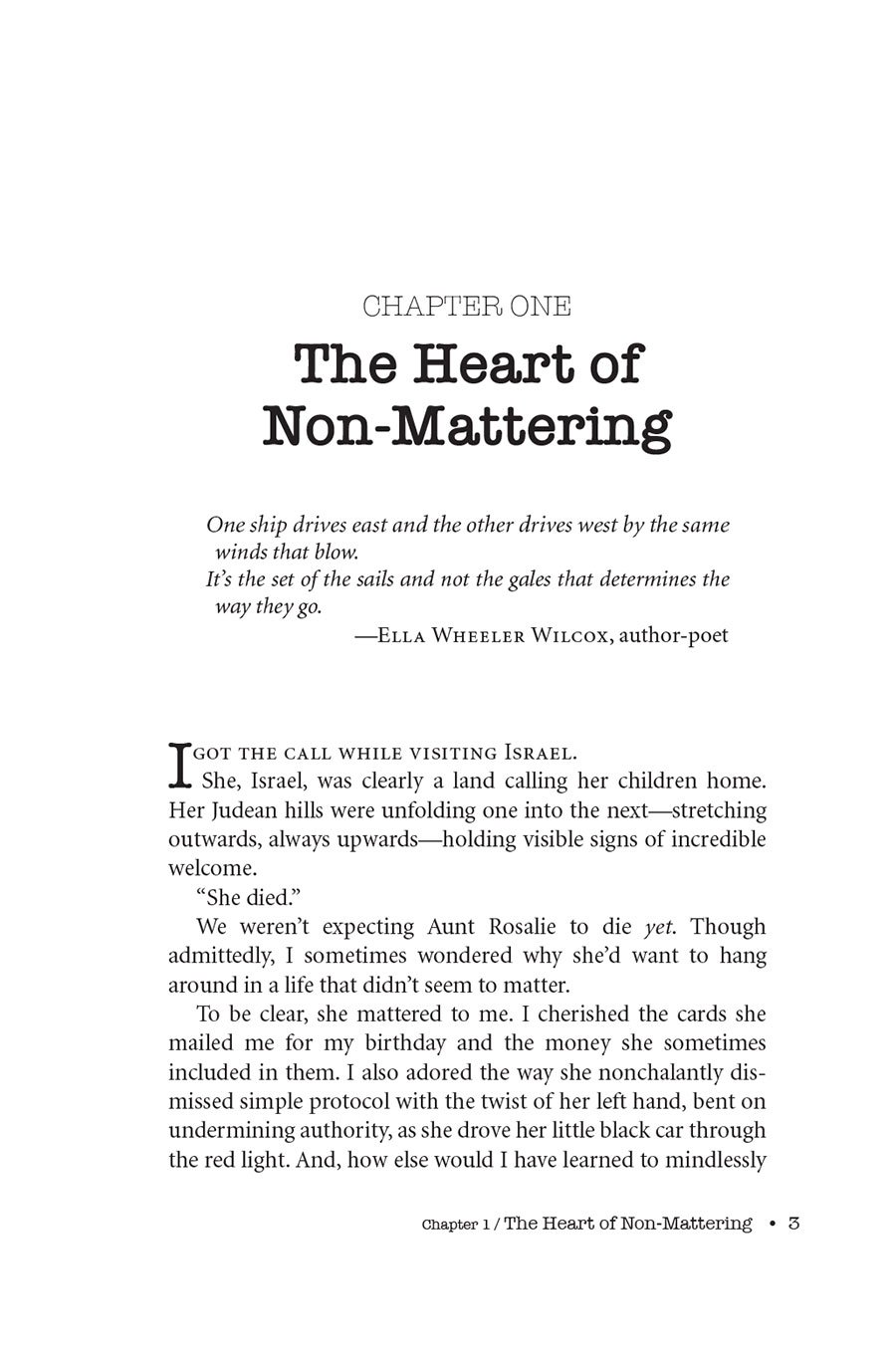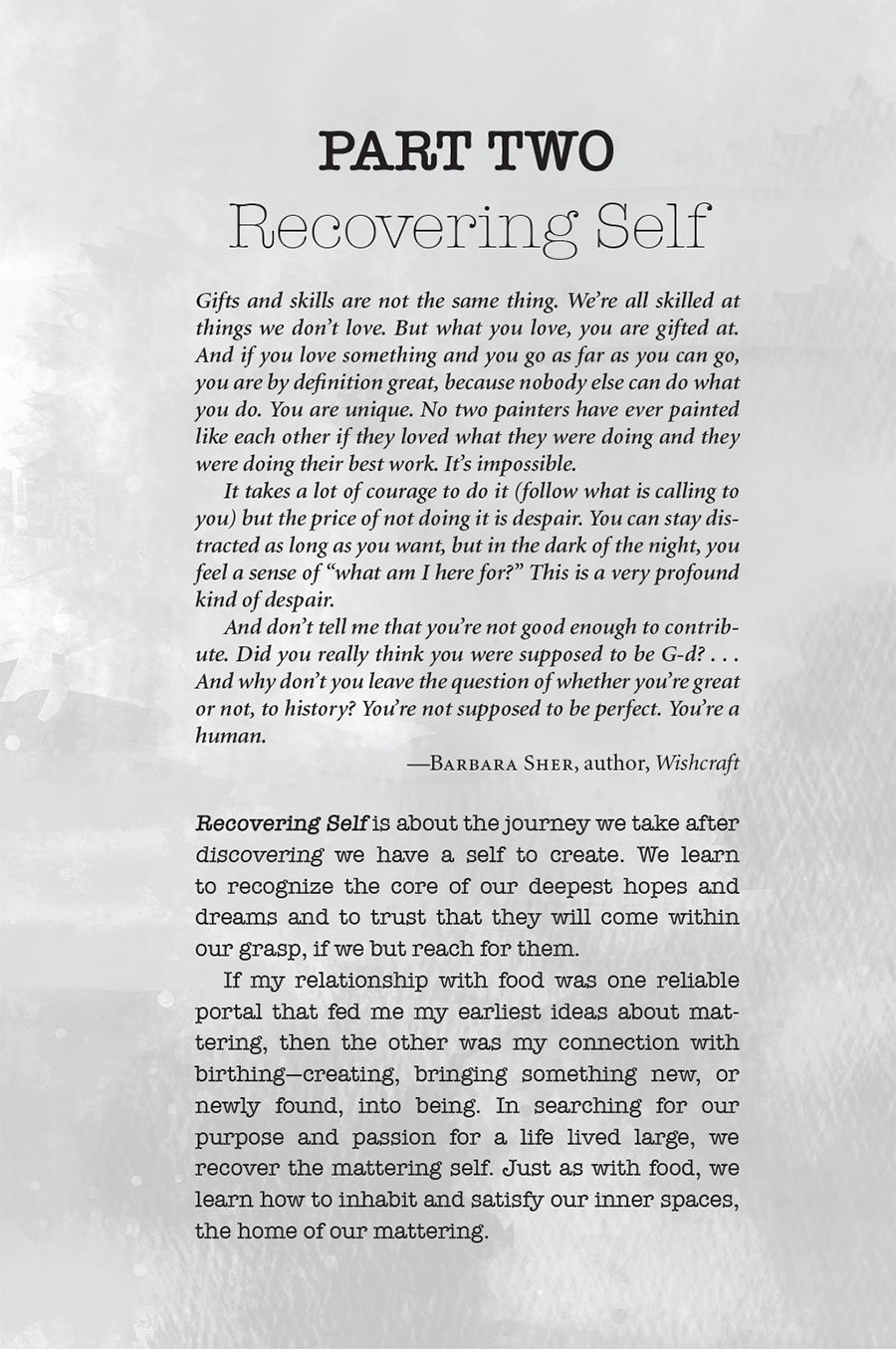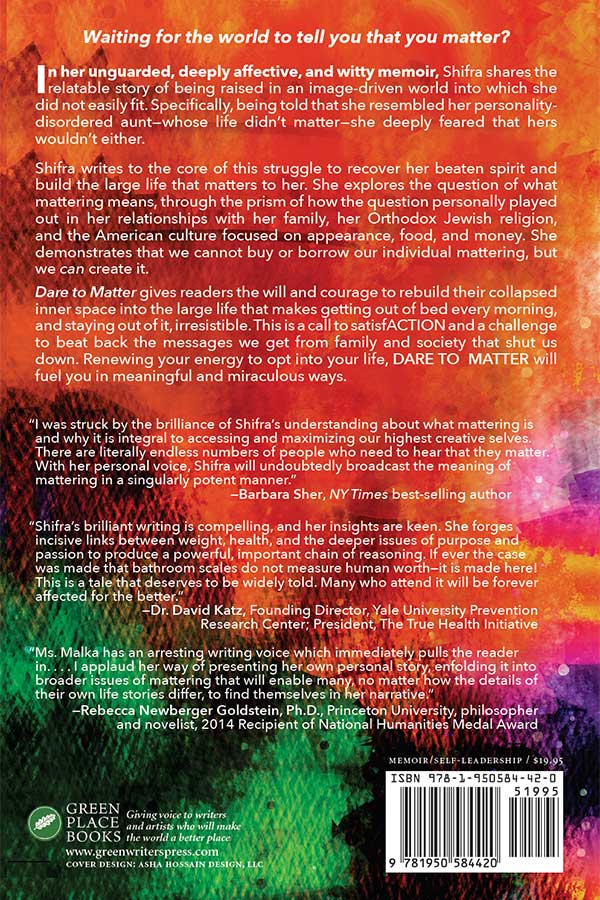Enjoy these excerpts from the preface and first chapter.
PREFACE
A Purposeful Word
Preface
I did not choose this story; only to tell it. A hard decision, and a demanding one, that many times had me rethinking why I’d put myself through the rigors of writing it. Since it does little to serve my image, it must have something to do with serving my purpose.
While we humans are busy being alive and even great, we make mistakes. We are supremely well-intentioned and we are often astonishingly misguided. And there are consequences.
And though thoroughly convenient to do so, it is nearly impossible to judge the people in our lives with absolute accuracy. Because the confluence of factors that bear down on a human being at any given moment can never be fully known or replicated by oneself, certainly not by another.
Best we can do is to tell the story of our experience and share the lessons learned as we found ourselves placed in the nexus of others’ lives, and they in ours. It is valuable to acknowledge and appreciate that which we profited, while minding the collateral damage as we experienced it, and to heal it as necessary.
A Word About Purpose
Funny thing about our lives is that we can seriously miss out on them, and never even realize it. We can walk past our highest purpose for being here and completely devalue it because we didn’t recognize it.
Many people, if not all, find themselves wondering about their purpose in life and what makes their lives meaningful and worth living. Surely you, as I, have been given ideas early on from others who help us to understand that “success” makes this whole living thing worthwhile. Sounds great until we stop and ask, what is success? What makes our lives large and powerful? Here again, others try to have us understand that success means having… possessions, positions, prestige, an array of unending iterations of advantageous circumstances that place us in power, pomp and privilege.
And here’s the main point of it all: this success is supposed to release us from the deepest fear that we are not special. It validates that we are indeed set apart from the mass of humanity who seem destined to travel their journey unobserved and uncelebrated, unadorned and unprivileged with society’s admiring eye. It confers on us largeness and importance. It whispers that now we can justify our existence. That we matter.
And then we watch those icons of success crumble. This year alone, a staggering number of our fellow humans who had inhabited the highest, coveted places of success in media, fashion, business, politics, and medicine have been undone by their inner challenges. After working so hard to finally make it, to “become,” they have un-become. We are shocked and saddened that famous designer Kate Spade and celebrity chef Anthony Bourdain opted out of their lives. We are increasingly bereft of our illusions about success, leaving us to redraw the lines of our thinking of what really makes our lives matter.
I cannot know how deeply this question agitates inside of others, but seems to me most people ask it and then move on about their daily lives without having to fully answer it. Maybe they are too busy being successful. Or maybe they renegotiate their definition, by choice or necessity. Not me. I found myself standing in the pain of this question over and over again, intensely and consistently, without letup. And then, when given the opportunity, to write a whole book about it.
Perhaps I should have seen this coming… that I’d write on this topic. I was born to two people who are an exquisite study in opposites—in background, in personality, in temperament, and in outlook. Though challenging, I quite loved learning from them two completely different languages of how to be human, and great, though not perfect. Nobody is.
You will hear more about Father and Mother; that they are extraordinary examples of people who had uncommon grit, a selfless capacity and yearning to build their community, and the deep desire to help their children strive for excellence in mind and character. They’d say that the happiness of their children was paramount to their own. They built a family on ideals of faith and duty, always trying to do the right thing, even when it got very, very hard. Indeed, they earned their true image of earnest, G-d fearing people who put others’ interest ahead of their own, over and over again, until it became their pattern of being, their identity.
And into this partnership entered a child named Shifra. I know her well; she’s the third of six children born to this couple…
Chapter One: The Heart of Non-Mattering
“One ship drives east and the other drives west by the same winds that blow.
It’s the set of the sails and not the gales that determines the way they go.”
—Ella Wheeler Wilcox, author-poet
I got the call while visiting Israel.
She, Israel, was clearly a land calling her children home. Her Judean hills were unfolding one into the next – stretching outwards, always upwards – holding visible signs of incredible welcome.
“She died.”
We weren’t expecting Aunt Rosalie to die yet. Although admittedly I sometimes wondered why she’d want to hang around in a life that seemingly didn’t matter.
To be clear, she mattered to me. I cherished the cards she mailed me for my birthday and the money she sometimes included in them. I also adored the way she nonchalantly dismissed simple protocol with the twist of her left hand, bent on undermining authority, as she drove her little black car through the red light. And, how else would I have learned to mindlessly nibble a biscuit while patting my growing midriff, oblivious to the trail of chaotic crumbs on my mother’s perfectly clean floors? Still, I had good reason to wonder if and how she mattered to anyone else in my family or to the world at large.
Aunt Rosalie was my father’s older sister, his only sibling. I watched both her and my father, ten years her junior, share their mother, my Grandma Lolly. Their lives could not have landed them more different roles. Hers was to dutifully serve her mother, while his was to be doted upon by her. As they each played their roles superbly, I noticed early on that Aunt Rosalie’s voice was often dismissed by family and friends as unimportant, silly, hostile, even crazy. I caught the roll of their eyes or the small smirk of their mouth when she’d state her opinion on anything, even something as mundane as “nice weather we’re having, ain’t it?” And this increasingly reverberated with me, that my emerging voice was beginning to be similarly silenced; that what I had to say did not matter and was not worth listening to.
The main echo, clear if not always loud, was that I was a lot like Aunt Rosalie. And to stop being like her immediately, if I knew what was good for me; which apparently I often did not. I wasn’t at all sure what that meant because I didn’t look like her in the slightest. A slim, black-haired female, with an olive complexion, her face sported full, well-shaped lips with lively almond-shaped eyes the color of lima beans. At 5’4’’, a respectable height for a woman of her time, Aunt Rosalie stood on two light legs that wore high heels with a model’s grace. The pictures I had seen of her younger years surprised me. She was smiling and possessed the type of pretty that said, “I care enough about myself to wear attractive clothes and tasteful make-up.” Her beach photos capture an enviable comfort with herself, obviously accustomed to drawing favorable attention from others.
By the time she was in my life, Aunt Rosalie was a lonely, fear-filled, and unfulfilled woman. Dull-colored pant outfits draped her sagging spirit. Argumentative words in her charming southern drawl fell out of her mouth in a half-baked, cynical way. She had become increasingly known throughout the family for her manipulative maneuvers, for her imaginative and irrational ideas, and for her provocative personality. Recounting conversations she had overheard was a specialty of hers, replete with subjective commentary tending to the negative side of things. I’d seen her on occasion fingering a piece of mail in our house that obviously wasn’t addressed to her. And standing behind a doorway listening in on a conversation belonging to someone else was a definite pastime. She’d often take the opposite side of a widely-held opinion just for the pun of it. I don’t think she did any of this purposely to get attention. I am not even sure she was aware of it at all. It was just the way she existed here.
Earlier in her life, I knew she did more than just exist. She had served as the volunteer president of her city’s local woman’s organization, arranging day activities and overnight trips for her female friends. She had also worked in a department store, even once buying a coveted baseball mitt for my father with money she saved from a week’s worth of work. Still, these noble acts could not garner her any enduring honor or respect. Rather, she somehow suffered the harsh and distant whims of others, managing to invite rejection from friends and strangers. Maybe she didn’t expect people to see the good in her, making her resort to defensive plays of character that naturally offended most people who didn’t know how to understand her.
Unwilling Child Witness
Throughout the years, Grandma Lolly and Aunt Rosalie were dutifully invited to our home, if not exactly joyfully welcomed. They’d come take up residence on the kidney-shaped, red velvet couch with my father wedged between them – one ear open to each. The glass-topped oval desk, adorned by two identical red and gold paisley velvet chairs at each edge, sat off to the side just for show. Its job was to hold my father’s hats, car keys and a book or two. A single chair sat importantly behind the desk, though it was not available to us children who might want to lazily sit there. And in an opposite corner stood a gold-edged, six-foot fountain that, when turned on, sent beads of oil sliding down delicate harp-like strings, which always felt to me like it was crying.
While my mother was often working hard at her home desk or in the kitchen, we children would be summoned by name to entertain our grandmother/aunt duo who would take turns restlessly pacing between the living room and kitchen, in search of someone or something with whom to engage. This aimless chit-chat walk must have irritated those in my house who were doing their important daily business of living life. But that did not include me because my life, I had been oft-advised, was not as important.
Just like Aunt Rosalie.
These seemingly too-frequent visits from Norfolk to our home in Baltimore featured on-edge and over-the-edge power struggles. Angry words were easily exchanged over Aunt Rosalie’s habit of leaving, on my mother’s kitchen table, her used Styrofoam cups of coffee that my mother was expected to serve her. Quietly taking her garbage, food and otherwise, was a recurring challenge indeed. Her quirky, predictably unpredictable behaviors drew out the powerlessness in others, particularly my mother. Sometimes this made my aunt seem powerful to me, that she could provoke such chaos in my usually generous, kind, unflappable mother. But then again, it looked to me like Aunt Rosalie herself always came up looking powerless too. Always coming in second, if at all.
Understand that on our home turf, hard work marked by quantifiable accomplishment and acclaim was prized above all. For us children, that meant academic success, a pleasing appearance, and a happy disposition; while for my parents, their increasing business success and community involvements took first prize. As my mother stood her superior ground by virtue of, well, her virtuous character marked by admirable achievements, Aunt Rosalie would trail behind. It seemed that these two women couldn’t be equal; if one was ahead, the other had to be behind. As a baseball fan, I can tell you that although the home team has an advantage, the visiting team is not doomed to automatic failure. But they do have to fight hard to win. In this comparative game, it seemed to me that to score, one had to have more to show for oneself. One had to be more, do more, have more, than the other to claim victory, and definitely had to prove they had the popular vote of an unquestioning majority, known as us children.
To my young eyes, it seemed that Aunt Rosalie could never win in any category, least of all in her parenting of her one daughter, an adored cousin of mine named Sylvia for whom I felt a sisterly cherish. I am not sure how one can accurately assess winners and losers in the tough sport of parenting, but I do know that Sylvia often had to put her mother into her place, even if it meant kicking her, which once left my aunt with a broken arm and a badly damaged self-worth, if she even had any. And on our home front, I well remember the time when, because (fortunately) we did not have enough beds to host them overnight, they’d opt for the local hotel, but not before setting the stage for a lingering struggle. Their hotel had a pool and, of course, they asked us children to join them for a swim, but neglected first to secure my mother’s approval of their plan. Excited, we asked my mother for permission to have fun, and when denied, I knew we had been pawns in this round of let’s prove who’s boss around here. Of course, our anger was provoked against our mother, for pre-adolescents cannot yet sense any context beyond the immediate, beckoning water to cool off a hot summer’s day. How uncool to all.
Grandma Lolly and Aunt Rosalie did not speak this language of superiority well. If I intuited correctly, they were instead well-versed in the democratic model of everyone being equal. Status was an entitlement, not something that had to be earned or deserved. I remember in this ongoing game when my aunt would pitch the smallest word or smirk, striking down a food or fashion choice, my mother’s glances would punish Aunt Rosalie for daring to say something designed to put her on more equal footing with my mother. But that would not stop her from trying to make my mother lose her superior standing, provoking her until the breaking point.
Breaking points were painful to watch. They sounded harsh and seemed unfair to those who didn’t see how and why they formed. As a first-hand, unqualified child witness silently recording the unsavory goings-on in these inner chambers of power, I found it impossible to judge who mattered and who didn’t. I desperately wanted both to matter. My loyalties, divided between my mother and my aunt, begged my compassion for each of them. The agony of trying to judge who was right and who was wrong, who was good and who was bad, overwhelmed me. In rendering judgment on each, while struggling to vindicate both for their human vulnerabilities, I exhausted natural reserves of childhood joy and innocence.
I cannot totally explain why I positioned myself as judge in a case between two women who I considered powerful. Maybe in handing down the verdict, I could rearrange my own identity for the better, at least in my own mind. Put myself on a bit of higher ground. One thing was certain: as a spectator, this long-lingering drama wounded me for much of my life. It was traumatic to see in the raw how people can wound each other, destroying their sense of worthiness, in both the actors and the spectators – possibly the most vulnerable of whom was me. I say traumatic because traumas, I’d come to learn, can be slow, steady, seemingly unremarkable assaults on something intrinsic to the healthy functioning of a breathing organism. Consistent, enduring messages of non-mattering fit this ill.
Crumbs of Mattering
Interesting that it was it on this ground of non-mattering that I actually tasted some mattering. I was the one who’d go over to Grandma Lolly and Aunt Rosalie to make them feel welcome. To throw a crumb of mattering, of worthiness, and of belonging. And that crumb fed me too. Not out of spite for my mother, not of duty to my father, but because my nature was to accept others. And besides they were funny and fun, informal and laid back – qualities that were a nice contrast to the more reverent, straight contours of our home. They also seemed fair to me, which somehow nobody else knew how to be. Because they asked me to be something that no one else needed or wanted from me – to be myself. Being my unintimidating self was the only condition for their friendship. They did not make fun of me. They did not insist on comparing me with my sisters and point out how I came up short or wide or inferior. And I understood that in this colder climate of mattering, I, as they, had none of the kinds of accomplishments that mattered and therefore, together we could not matter much, if at all. And, to me, that felt quite important.
Pre-scripted: My First Role
The language of not mattering is held together by notes of disdain and discounting, its main sound is guttural and harsh, Do not be who you are. Worse, who do you think you are? Curiously, not mattering was most effectively spoken when my mouth was closed, while listening to others speaking to or about me. “What will ever become of you? Nothing, that’s what.” “You make everything so complicated.” “You are in your own world; snap out of it.” “You have no common sense.” “Don’t listen to her; she doesn’t know what she is talking about.” “She is so stubborn and difficult.” It was vowelized with ridiculing looks and sighs of desperation or embarrassment. And I began to speak it to myself: “Why must you be different than your sisters and your friends? Why can’t you just be normal, just do it like everyone else?”
I had been given my script early on. As mentioned, my main role was cast like Aunt Rosalie, with my big line: Do not be like Aunt Rosalie who you are so similar to. And I’d overtax my brain wondering what it was about her and me that made our roles so parallel. Was it our shared green-eyed perspective on life leaving us feeling small in our own eyes, prompting us to then act in accord with that unflattering assessment? Maybe it was the inability to restrain our impulsive emotions of eating whatever and whenever we wanted, saying what we pleased, and showing great frustration easily and intensely when things did not go our way. Was it the way we could spin people’s heads with our imaginative account of something that didn’t quite happen in the way they experienced it that left them checking to see if their heads were on straight? Or could it have been the special powers we both seemed to have when it came to draw out my mother’s long, forgiving limits, leaving her undermined and powerless, yet somehow soliciting my father’s pity for us rather than for her?
Lessons in Loyalty
All loyalties were put to great test in this ongoing drama spanning nearly four decades of my life. It was much more than just my own loyalties to my parents and aunt that begged for some objective relief. My father’s allegiance to my mother came under much scrutiny, as did hers to him, in these murky matters between spouses. I call them fault lines, as in shaky ground beneath all who tread, a consuming place for all to be amply faulted and hurt. And somehow I was caught smack in the middle, which couldn’t have been too helpful to my already vulnerable (dis)position.
It was a confusing test for all, and here is what I began to understand…
